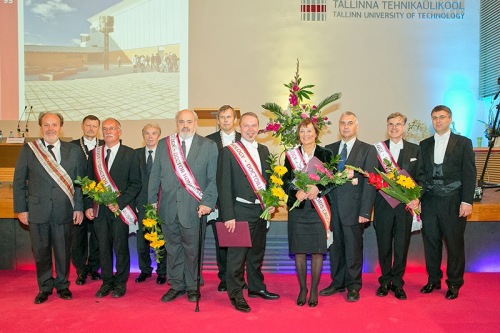Honorary doctorate for Prof. Hans-Werner Schock

Prof. Hans-Werner Schock (3.f.l.) receives the honorary doctorate at University of Tallinn.
Tallinn University of Technology (TTU) has named Prof. Hans-Werner Schock recipient of an honorary doctorate in recognition of Schock’s achievements during TTU’s integration into the Western research community after the 1990 fall of the Iron Curtain.
According to Schock, “TTU was already actively conducting research on monograin layer solar cells way before 1990.” Once the Iron Curtain came down, it was necessary to integrate solid Eastern European research sites like Tallinn into the European research community.
“At the time, I was coordinator for a major EU project and had the chance to win over Estland with TTU as one of our partnering institutes,” says Schock. This marked the beginning of a regular success story: The TTU Institute of Materials Science quickly became integrated in the wet european research alliances and built up a solid international reputation for itself. Schock continued to collaborate with TTU over the years: “At this point, TTU has established itself as an important player in photovoltaics research – our collaboration has consistently proven very fruitful.”
Today, the university is internationally ranked among the very top. Hans-Werner Schock is the man to thank for giving the initial impulse back in the 90’s. Reason enough for TTU to bestow upon him their honorary doctorate in mid-September of this year.
HS
https://www.helmholtz-berlin.de/pubbin/news_seite?nid=13843;sprache=en
- Copy link
-
More time for discussions
The South African chemist Denzil Moodley is the first Industrial Research Fellow at HZB. He is playing a leading role in the CARE-O-SENE project. The Fellowship program aims to further accelerate the development of an efficient catalyst for a sustainable aviation fuel. An interview about the CARE-O-SENE project and why it is so important for scientists from industry and public research to work together.
-
Green fabrication of hybrid materials as highly sensitive X-ray detectors
New bismuth-based organic-inorganic hybrid materials show exceptional sensitivity and long-term stability as X-ray detectors, significantly more sensitive than commercial X-ray detectors. In addition, these materials can be produced without solvents by ball milling, a mechanochemical synthesis process that is environmentally friendly and scalable. More sensitive detectors would allow for a reduction in the radiation exposure during X-ray examinations.
-
Electrical energy storage: BAM, HZB, and HU Berlin plan joint Berlin Battery Lab
The Federal Institute for Materials Research and Testing (BAM), the Helmholtz-Zentrum Berlin (HZB), and Humboldt University of Berlin (HU Berlin) have signed a memorandum of understanding (MoU) to establish the Berlin Battery Lab. The lab will pool the expertise of the three institutions to advance the development of sustainable battery technologies. The joint research infrastructure will also be open to industry for pioneering projects in this field.
